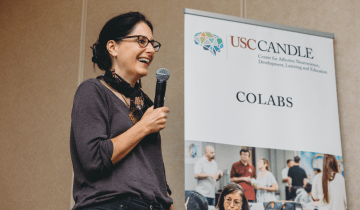For the past several years, there have been numerous reports about how in-demand math teachers are, especially with the growth of occupations that require strong math foundations such as data scientists and research analysts. Data from the 2020–2021 school year showed that 32% of public schools were unable to fill a teaching position for math. In the post-pandemic period, there has been teacher burnout and additional turnover. Many math teachers do not feel adequately prepared to teach, and this may relate to their own lack of subject matter understanding and/or the lack of resources and training available to make them feel confident in their instructional abilities.
Building on her previous research to improve teacher performance and student achievement with the use of artificial intelligence (AI), USC Rossier Associate Professor Yasemin Copur-Gencturk has been awarded $6.7 million from the National Science Foundation (NSF) to pursue two research projects that are aimed to improve elementary math instruction. It is the single largest grant a USC Rossier faculty member has secured from NSF.
One of the projects will create a diagnostic tool to measure teachers’ content and pedagogical content knowledge of numbers and operations for elementary school teachers. The goal is to develop a diagnostic measure that will provide insights into teachers’ mastery of the key elements of content and pedagogical content knowledge needed for teaching. Many existing assessments don’t provide adequate insights into these two knowledge areas that teachers need, which hinders professional development efforts to support teachers.
Copur-Gencturk and her team will not only develop the diagnostic assessment tool, but they plan to produce research articles and workshops about the reliability and validity of this assessment and what they learn about teachers’ content and pedagogical content knowledge.
“To provide effective professional development for math teachers, we need to know where teachers are in terms of their understanding of the foundational ideas behind the content they teach, and their pedagogical content knowledge which involves knowing how students think about working through certain concepts and how instructional strategies and representations promote student learning,” said Copur-Gencturk. “With this diagnostic tool that we will create, we’ll be able to examine the ways in which professional development programs are successful in developing these knowledge bases. We’ll also be able to research the role that different components of such knowledge play in instruction and student learning.”
The next project is also aimed at enhancing content and pedagogical content knowledge for elementary school math teachers, but it will utilize AI to create a personalized, active learning environment for the teachers. The ultimate goal is to change student outcomes at scale by having an AI-guided tool for teachers that will provide feedback as the instructors work through activities on foundational concepts about numbers and operations across grade levels as well as how the teachers understand the way that students learn those concepts and how instructional tools and practices can be adapted to help students master math material. The AI tool will be the facilitator that guides the teachers through an interactive professional development process, enabling instructors to receive professional development, anytime and anywhere.
This AI tool will create a personalized, active learning environment for teachers. When teachers who are going through the training need additional support, then the AI tool will provide an exercise/material that guides them to master the required skills and knowledge for teaching mathematics. Teachers will receive just-in-time feedback as they work through the professional development program. When teachers receive feedback quickly, they can become more productive in their learning because they aren’t waiting for an actual trainer to provide that feedback, and they can quickly apply the correct knowledge and techniques.
“Because elementary school teachers teach multiple subjects, they have limited opportunities to develop content-specific expertise in teaching mathematics. One way to address this challenge is to create content-focused professional development programs that focus on the key knowledge and skills that matter in quality teaching and student learning. In this project, we will develop an artificial intelligence-based program that integrates research on mathematics teaching and learning as well as artificial intelligence, to enhance teachers’ knowledge of how to teach numbers and operations,” said Copur-Gencturk.
“We are optimistic that by making this program accessible to teachers anywhere and anytime and by providing instant feedback on their learning, we are addressing the opportunity gaps some of our teachers experience in accessing quality professional support. This will move us one step closer to improving instruction and student learning at scale.”
Copur-Gencturk’s goal is to make the AI professional development program for elementary math teachers to be available online as a fully developed program so that teachers can access it anywhere. Teachers from rural communities or districts located far from county offices of education or college campuses where training sessions are often held could benefit immediately from having access to an AI-driven training program at their fingertips. As AI technologies improve, researchers hope to be able to create more interactive and personalized professional training experiences for teachers that positively impact student achievement.





